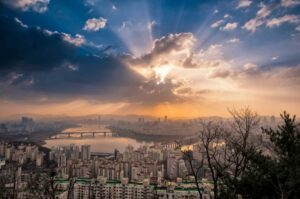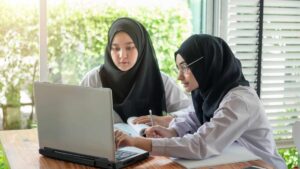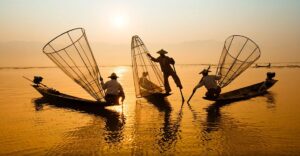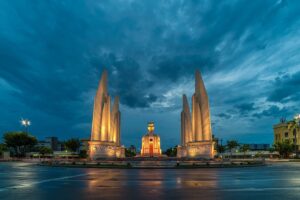January 10, 2024 Asia Foundation
Every January, we ask our country representatives in Asia and the Pacific to share their predictions for the year ahead. While prediction is an uncertain art, their forecasts suggest that 2024 will be a year dominated by elections, economics, and geopolitics.
Elections will take place this year in India, Indonesia, Korea, Mongolia, Pakistan, Sri Lanka, and three Pacific Island nations. June elections in Mongolia will be the first to include both direct and proportional representation. Experiments with federalism and decentralization continue to make news in Nepal and Indonesia. In more than one country, elections are entangled with issues of religious nationalism.
With the return to robust economic growth, many countries seem poised to shake off the last, lingering effects of the Covid economic downturn, but several still face trouble ahead for different reasons, including Pakistan, Sri Lanka, and Timor-Leste. For Asia’s developing economies, technology remains a pillar of national development strategies.
In Southeast Asia, Laos will assume the chair of ASEAN this year, while Vietnam has just elevated its diplomatic relations with geopolitical rivals China and the United States. Thailand has achieved an uneasy political equilibrium, but violence seems unlikely to diminish in neighboring Myanmar, and tensions are rising between Pakistan and Afghanistan. Meanwhile, the wars in Ukraine and the Middle East, the threat of climate disruption, and the possibility of a global recession are fueling anxiety across the capitals of Asia and the Pacific.
Here, now, is a country-by-country look at the news of 2024, before it happens.
Peering into the prospects for 2024. (Photo: The Asia Foundation)
Afghanistan
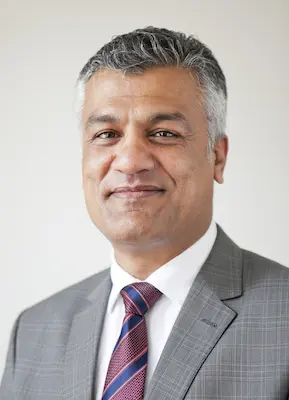
Abdullah Ahmadzai
Nearly two and a half years after the return of Taliban rule, Afghanistan has seen some security improvements, but still faces escalating challenges. Issues such as mounting poverty, growing unemployment, widespread migration, economic hardship, and deficient public services have become more evident. Of significant concern is the persistent restriction of women’s rights, severely constraining their access to education and work outside the home and hindering their participation and advancement in society.
The Taliban’s continuing reluctance to discuss a more inclusive government is perpetuating Afghanistan’s international isolation as an unrecognized state, and the restriction of political participation to religious loyalists and Taliban fighters is undermining domestic social cohesion and intensifying tensions among non-Taliban factions seeking representation. It is crucial to involve all segments of society—civil society, political figures, women, and minorities—to prevent further conflict and steer Afghanistan toward long-term stability.
As a nation bordered by six countries, including three Central Asian states and Iran, China, and Pakistan, Afghanistan’s stability is pivotal for regional security and trade. The construction of the Qosh Tepa canal, begun in 2022 with the ambitious goal of converting 550,000 hectares of desert into vital agricultural land, has strained relations with the neighboring states that rely on the downstream waters of the Amu River. Diplomatic measures are imperative to prevent conflict over projects of this kind. At the same time, tensions with Pakistan, especially concerning the Afghan Taliban’s alleged support for the Islamic militant group Tehreek-e-Taliban Pakistan, are escalating and require immediate attention.
Addressing these multifaceted challenges demands a coordinated approach from neighboring nations, emphasizing a need for collective engagement with the Taliban. Simultaneously, the international community and Afghans within the country and the diaspora must persist in advocating for gender equality in education and employment. Constructive dialogue with the Taliban leadership is also essential to establishing an inclusive government representing all segments of society in order to address the country’s dire circumstances, especially the struggling economy. This will require a political process that enables the Afghan people to elect their leaders. The Taliban also need to actively pursue impartial engagement with all Afghan factions, which could potentially be facilitated by the United Nations and other stakeholders.
Such efforts will pave the way for a more promising future for Afghanistan.
Bangladesh

Kazi Faisal Bin Seraj
On January 7, in national elections that were largely uncontested, voters in Bangladesh returned the ruling Awami League to power for an unprecedented fifth term. The notable absence of the major opposition party from the electoral process raises concerns about the inclusiveness of this democratic exercise.
As the nation navigates this fraught political terrain, an ominous economic downturn has cast a shadow over its future. The threat of a financial crisis looms large, exacerbating the danger of a political crisis if stability is not promptly achieved after the elections.
Beyond its borders, Bangladesh finds itself at the intersection of geopolitical interests as contesting superpowers eye the nation strategically. Tensions between global players could further complicate the domestic situation, potentially aggravating the country’s economic and political challenges.
As Bangladesh stands at this critical juncture, the interplay of elections, economics, and geopolitics will undoubtedly shape the nation’s trajectory in 2024.
Cambodia
Meloney Lindberg
Last July the Cambodian people elected a swathe of younger leaders who promised to pursue their mandate with renewed vigor and purpose. The 100-days milestone of the new government has now passed, and there have been many examples of increased consultation and dialogue with development partners, civil society, the private sector, and academia. This increased engagement generally bodes well as Cambodia strives to meet new challenges in 2024.
At the same time, there are concerns that a global recession and continuing armed conflict in Ukraine, the Middle East, and elsewhere will cause significant disruption to the Cambodian economy. To mitigate this risk, the government has prioritized improving livelihoods, public service delivery, and social protection measures. While the World Bank predicts that Cambodia’s economy will grow by a healthy 5.8 percent in 2024, this is still below the country’s typical pre-Covid growth rate of more than 7 percent.
The new government has also focused on technology as a pillar of its national development framework—the “Pentagonal Strategy”—which seeks to achieve upper-middle-income status by 2030. While this target is undeniably ambitious, there could be many laudable achievements along the way, among them ensuring that 70 percent of the nation’s energy needs are met by renewable sources, and creating more opportunities for young people through better formal and vocational education.
Amid this air of optimism, all eyes are on the younger leadership as they seek to build credibility and deliver on their promises to a tech-savvy younger generation of Cambodians who harbor great expectations.
India

Nandita Baruah
A recent article in the Chinese Global Times, quoted in India’s WIONews, offers some interesting observations about India. In the article “What I feel about the ‘Bharat Narrative’ in India,” Zhang Jiadong, director of the Center for South Asian Studies at Fudan University, Shanghai, writes:
India has always considered itself a world power. However, it has only been less than 10 years since India shifted from multi-balancing to multi-alignment, and now it is rapidly transforming toward a strategy of becoming a pole in the multipolar world.
India’s global political engagement under the current leadership reflects a new way of doing business, driven by India’s own economic and social needs instead of the influence and interests of others. In his book India’s Moment, former ambassador Mohan Kumar writes:
When India approaches international negotiations and deals with the outside world, the one fundamental factor uppermost in the mind is the potential impact of the negotiating outcome on the millions of people who live in poverty.
Indeed, India is finding that a multipolar world fits quite comfortably with its own emerging policy of pro-poor economic nationalism. Under this new geopolitical stance, international agreements—be they for agriculture, economic development, women’s empowerment, or climate change—should in no way negatively impact India’s domestic manufacturing and consumer markets or the hundreds of millions of Indians at the lowest rung of the economy. Ambassador Kumar has called this a “poverty veto,” aimed at protecting India’s national interests.
The focus on strengthening India’s economic prowess by promoting a strong national economic agenda that also supports the reduction of absolute poverty has paid dividends. The success of India’s space, science, and technology sector can be seen in the progress of the Chandarayaan lunar exploration program. Last year witnessed the emergence of 54 new space startups, bringing the number of fledgling firms in the sector to 204. Indian space startups in 2023 received roughly $124 million in new funding, pushing the total investment in this sector to more than $380 million, according to the Indian Space Association.
Another area that has redefined India’s economic landscape has been the creation of a unified payments interface (UPI), a digital payment infrastructure for all economic transactions. Worldline reports that monthly UPI transactions rose from 151 million in January 2018 to 9.3 billion in June 2023. Significantly, this growth has been broadly democratic, primarily driven by person-to-merchant transactions.
The UN’s World Economic Situation and Prospects report for 2024 projects Indian economic growth of 6.2 percent, supported by robust domestic demand and strong growth in the manufacturing and service sectors. India’s economic growth has consistently exceeded 6 percent. But India is still largely a farm-based economy in many respects, and a major climate disruption could be economically perilous. In response, India needs to invest more in climate mitigation measures.
While labor market indicators improved in 2023, with labor force participation in August reaching its highest rate since the onset of the pandemic, gender disparity remains a problem. According to the Periodic Labor Force Survey (PLFS) report for 2022–2023, 37 percent of Indian women participate in the labor force, up 4.2 percentage points for 2023, but this is still inequitable. More investment is needed in girls’ education, skills development, entrepreneurship, and workplace safety.
Finally, India needs long-term political stability to sustain its current economic growth and development trajectory. 2024 is an election year. If the public signals its approval of the government’s social, economic, and political approach, it could provide the stability that India needs to achieve developed-nation status.
Indonesia
Hana Satriyo
For Indonesia, 2024 will be dominated by politics as the world’s third-largest democracy holds its sixth nationwide elections since democracy was restored in 1998. On February 14, 200 million Indonesians are expected to cast their votes at over 820,000 polling stations to elect a president, a bicameral national legislature, and provincial, regency, and city councils.
The political competition has been marked by many surprises and intense debates. One controversial issue has been a Supreme Court ruling changing the minimum age for presidential and vice-presidential candidates, enabling President Jokowi’s son to join the contest as the running mate of Prabowo Subianto. The other two candidates are former governor of Jakarta Anies Baswedan, and former governor of Central Java Ganjar Pranowo. A presidential run-off election is expected in June, as it is unlikely that any candidate will win more than 50 percent of the vote in the first round, as required by law.
Elections for chief executives in 548 localities will be held in November. Heads of 415 regencies and “majors” of 98 cities will be chosen, while 37 provinces will elect governors. The simultaneous election of governors, majors, and heads of regencies in 2024 will meet a long-held goal of Indonesia’s decentralization effort, the synchronization of formal planning cycles, especially the five-year, medium-term planning that was previously undertaken at different times across the country.
Indonesia’s economic outlook will be a bit brighter in 2024. The World Bank projects that the economy will grow by an average of 4.9 percent per year in 2024–2026. Private consumption will be the primary engine of growth, supported by election-cycle spending. Experience from the 2014 and 2019 elections suggests that consumption rises in election periods, and the economic impact may be substantial.
Civil society and student groups are expected to play a significant role in maintaining the resiliency of democracy throughout this dynamic period and beyond, as Indonesia marks 25 years of post-Suharto Reformasi. The advent of artificial intelligence and cyberattacks on democratic processes pose a worrisome challenge, but it is expected that Indonesians will continue to see the importance of free and fair elections as the key foundation of the country’s democracy.
Seoul, Korea, cityscape (Photo: Robert Koehler / The Asia Foundation)
Korea
Kyung-sook Lee
The general election on April 10 will be the highlight of 2024 in the Republic of Korea (ROK). With the National Assembly currently dominated by the opposition Democratic Party of Korea (DPK), the coming election holds significant implications for President Yoon Suk-yeol’s leadership. A victory by his People Power Party could empower President Yoon to continue implementing his policy agenda, enhancing his ability to navigate international relations, foster strategic partnerships, and position Korea as a key player in global affairs. A DPK victory could increase opposition to those policies, requiring adept negotiation to navigate political hurdles. External factors such as geopolitical tensions and global economic uncertainties may also pose challenges for President Yoon’s leadership.
In foreign affairs, Korea will continue to bolster relations with the United States and Japan while maintaining its aggressive stance towards North Korea and its wariness towards China. South Korea’s new, conciliatory attitude towards Japan has been welcomed with open arms by Japan and the United States. There are still issues to be resolved, but Japan’s restoration of Korea to the export “whitelist” is an important first step towards further economic, intercultural, and military cooperation. In contrast, South Korea will maintain its hardline stance towards North Korea, as the 2018 Pyongyang Joint Declaration between the two Korea’s seems in danger of unraveling. China remains Korea’s top trading partner by a substantial margin, but the ROK’s close relations with the United States will continue to complicate this relationship.
The National Assembly increased the 2024 budget for official development assistance (ODA) to 6.5 trillion won (approximately 5 billion dollars), a roughly 44 percent increase from 2023. This hefty boost could significantly advance President Yoon’s Indo-Pacific strategy, positioning Korea as an influential contributor to global development and cooperation. But spending this ODA windfall will also require meticulous planning, training, and capacity building to ensure that projects are effectively managed and executed. Productive collaboration with other stakeholders, including international organizations, NGOs, the private sector, and other donor countries, will also be crucial for Korea to make a meaningful contribution to global development, foster sustainable growth, and address pressing global challenges.
Laos
Todd Wassel
While Laos often garners less attention than its regional neighbors, 2024 will be different as Laos assumes the ASEAN chairmanship and is thrust into the spotlight in an increasingly contested Indo-Pacific arena. Laos will attempt to leverage the power of the spotlight with a “Visit Laos” campaign to attract international tourists, and their much-needed foreign currency, to its weakened, post-Covid economy.
Although it faces macroeconomic instability and lacks the extensive infrastructure of its regional neighbors, Laos is poised for a diplomatic balancing act, using its position in ASEAN to engage with regional powers under the chosen theme Enhancing Connectivity and Resilience. This theme reflects a domestic focus on economic challenges and underscores the land-locked country’s strategy of increasing land links and exporting green energy across the subregion. At the same time, the theme notes that “climate change, natural disasters, and traditional and nontraditional security issues remain pressing challenges” for the region, and that the ASEAN community must grow stronger to meet the moment.
While it is unlikely that Laos will achieve a breakthrough on the South China Sea dilemma, it may still prove adept at balancing interests and showcasing its ability to manage larger regional neighbors and dialogue partners. The unprecedented challenge lies in navigating the Myanmar crisis. Southeast Asian leaders have agreed to set up a “troika mechanism,” comprising the immediate past, current, and incoming chairs of their regional grouping, to work out a consistent approach to the crisis in Myanmar. If the situation on the ground changes in Myanmar, an opening may present itself quickly, and Laos, which shares a border with Myanmar, could take the lead in making progress for the regional block. In what is usually a predictable and steady-paced domestic environment, the ASEAN chairmanship promises a more varied landscape for Laos in 2024, where it must navigate domestic economic priorities, diplomatic challenges, and regional dynamics all at once.
Young women students in Malaysia (Photo: the Asia Foundation)
Malaysia

Robin Bush
As Malaysia heads into 2024, analysts are giving the first year of Anwar Ibrahim’s “Unity Government” a mixed report-card. On the plus side, Malaysia has enjoyed growing public engagement in policy discussions and positive institutional shifts such as a strengthened judiciary and expanded parliamentary roles. Some substantive policy outputs of the year just ended include the Industrial Master Plan 2030 and the National Energy Transition Roadmap, as well as important legislation abolishing the mandatory death penalty, decriminalizing suicide, and ensuring child protection, guaranteed social security for housewives, and the recognition of trade unions. On the downside, many reformists are angry at perceived back-pedaling on long-promised reforms, and they accuse Anwar of pandering to an Islamist agenda for his own political advantage. This, combined with increasingly fraught race relations and little concerted effort to promote social harmony, have intensified divisions among communities.
In the last month of 2023, Anwar reshuffled his cabinet, strengthening the Finance Ministry and adding a new portfolio, the Digital Ministry. One might expect 2024 to see an emphasis on Malaysia’s digital transformation and its leadership role in the digital economy across the region. Other priorities that will likely get attention in 2024 are climate change and related developments, the possibility of a carbon tax, and perhaps the reduction of some of the fuel subsidies that both obstruct climate action and weigh down the economy. Meaningful reforms to lift wages across all levels of the workforce and provide workers with some retirement security should also be prioritized. One might hope that Anwar’s government would take a few more risks in support of anticorruption and governance reforms, while keeping a strong focus on inclusive economic growth.
Mongolia
Mark Koenig
Mongolia’s robust economic growth in 2023, driven by coal and other mineral exports, gives some cause for optimism in 2024. A relatively stable period of governance also allowed Prime Minister Oyun-Erdene’s cabinet to complete some significant policy reforms in 2023. These include an overhaul of education laws and a constitutional amendment that will introduce a mixed majoritarian and proportional-representation electoral system and, for the first time since Mongolia transitioned to democracy, increase the size of Parliament.
The constitutional amendment was supported by all major Mongolian political parties, but the public remains somewhat skeptical about increasing the number of MPs from 76 to 152. Mongolians are also frustrated by persistent issues ranging from corruption to Ulaanbaatar’s stubborn traffic congestion and air pollution. Concerns about efforts to limit press freedoms and online speech have also arisen.
Early signs also point to a difficult winter ahead, including a dzud, a severe winter climate phenomenon that could threaten the livelihoods of the more than 200,000 herder families and increase migration to the already crowded cities, where uncertain supplies of fuel and electricity from Russia are causes for concern.
Against this background, Mongolia is approaching a consequential parliamentary election in June, the first since the passage of the election-related constitutional amendment. While the ruling Mongolian People’s Party retains significant support, frustration with issues like corruption could boost the opposition, particularly in urban areas. Regardless of which party wins the most seats, the increase in MPs and the mixed electoral system are likely to deliver a more diverse parliament with members from a larger number of parties, which may significantly change the policymaking environment.
The emergence of new parties is also likely to add dynamism and uncertainty to the local elections coming in the fall. But for this new electoral system to have a positive impact on democratic legitimacy, it will be important that citizens understand how it works, which will require significant civic education during the first half of 2024.
Myanmar
Mark McDowell
Almost three years have passed since the military coup that toppled Aung San Suu Kyi’s democratically elected government, but the junta’s State Administration Council (SAC) has had no success in consolidating its rule in Myanmar. The last months of 2023 found the junta suffering sustained and significant battlefield losses on multiple fronts to both Ethnic Resistance Organizations and People’s Defense Forces. The junta has now lost control of large swathes of the countryside, not only in the traditionally restive ethnic minority areas, but also in the Burmese heartland of the country.
2024 will be a decisive year for the political, military, and economic struggle between the junta and the loose, diverse coalition of forces hoping to topple them and install some kind of federal democratic government. A negotiated settlement is extremely unlikely, and the SAC has repeatedly postponed its own ostensible timelines for elections and the end of military rule. While many outside analysts have predicted the collapse of the junta in the coming year, the Myanmar military has survived similar challenges for decades and has shown no sign of concern for the will or welfare of the people.
Early 2023 saw signs of economic recovery after the first two years of the coup, but conditions deteriorated in the second half of the year, accelerated by increasing conflict and attendant disruptions to movement and trade. The population feels the effects on a daily basis, from inflation and financial panics to extended power outages that affect even major cities. There is no prospect of a significant turnaround in the coming year.
Poverty continues to deepen and spread, with The United Nations Office for the Coordination of Humanitarian Affairs warning that fully one-third of Myanmar’s 55 million people are currently in need of humanitarian assistance, and that the developmental gains achieved during the brief restoration of democracy have now been entirely wiped out. Myanmar added a million more internally displaced persons in 2023, bringing the total to 2.6 million. These human tragedies are unlikely to be reversed under military rule.
Nepal
Meghan Nalbo
More than a year into their five-year terms of office, the new guard of local, provincial, and national elected officials is now firmly in place in Nepal. The next two years, 2024 and 2025, will be defined by their progress on essential, if not politically compelling, reforms as Nepal grapples with its highest national debt in two decades, 6.1 percent of GDP, and struggles to achieve a modest projected growth rate of 3.9 percent, below the average of 5.6 percent projected for South Asia as a whole.
Economic turnaround and reform of fiscal policies, including the ongoing challenges of microfinance, are bread-and-butter issues for the average Nepali. Political leaders will have to juggle priorities amidst mounting discontent over unemployment and labor migration and anticipated revelations of large-scale corruption. Paramount among these priorities will be charting a course for engagement with India after the historic elections in Nepal’s southern neighbor. Local conflict and agitation will continue among the supporters and detractors of the federal system itself, established by the 2015 constitution, which promises inclusive decision-making and development for Nepal’s dozens of ethnic minority communities, but which still has kinks to iron out.
The most pressing areas of reform this year will be in three principal domains: legislative reforms of the electoral system, the civil service, and intergovernmental jurisdictional boundaries; judicial rulings to clarify the law on federalism; and internal reform of political parties. Failure to make progress in at least one of these areas could ignite calls for broader constitutional amendments.
The strongest leaders will be those who stay laser-focused on reform despite the national state of economic distress and the distraction of political appeasement through anticipated government reshuffles. The greatest threat lies in the failure to act, particularly to address the looming challenges of climate change in the Himalayas and downstream ecosystems, natural disasters, and a deep digital divide that could cripple Nepal’s economic competitiveness and the state’s control of its own security by leaving a significant portion of the workforce without up-to-date digital skills.
To bolster its foreign relations, Nepal is well-positioned to cultivate deeper peer networks across Asia, especially with nations facing similar challenges. Nepal’s domestic development goals are inextricably connected to its diplomatic and trade relations. Strengthening ties with smaller and medium-sized states will help the nation strike a balance between domestic and international priorities, negotiating its needs with its international counterparts while prioritizing legislative and political reforms at home.
Men fishing in the Pacific Islands (Photo: The Asia Foundation)
Pacific Islands
Sandra Kraushaar
Resilience and public trust continue to top the development agenda in the Pacific Islands.
There are several elections slated for 2024, including those in United States and India, which will have some implications for the Pacific given recent interest in closer ties. Within the region, all eyes will be on national elections in the Solomon Islands, Tuvalu, and Palau.
In the Solomon Islands, which successfully hosted the 2023 Pacific Games, national elections this year will reveal some of the complexities entangling national and provincial politics. The recently adopted Australia-Tuvalu Falepili Union Treaty, which provides migration pathways to Australia for Tuvalu citizens threatened by rising seas, along with binding provisions for security cooperation, will be a point of contention in the forthcoming Tuvalu national elections, as opposition leader Enele Sopoaga has promised to scrap the treaty if he is elected to lead the government. November elections in Palau, which recently signed the new Compact of Free Association with the United States, will likely focus on the proposed permanent deployment there of U.S. Patriot missile defense batteries. Finally, on January 2, 2024, the Republic of the Marshal Islands elected Dr. Hilda Heine to a nonconsecutive second term as president. Along with Prime Minister Fiame Naomi Mata’afa of Samoa, the region enters the new year with two female heads of state for the first time.
The Fiji Reserve Bank has identified a litany of risks for 2024, including geopolitical conflicts, tightening monetary policy, climate change and natural disasters, labor shortages, and constraints on the vital tourism industry. The same could be said for most of the region.
2024 is looking like the year to have a plan. Fiji recently announced consultations on a comprehensive National Development Plan that will “facilitate practical solutions to the social and economic sector” while also turning attention to institutions of governance. The regional 2050 Blue Pacific Continent strategy has come into effect, with Pacific leaders signing off on the Implementation Plan during their annual meeting in November 2023. Papua New Guinea handed down its largest-ever budget for 2024, with a focus on jobs and growth and a plan to return to budget surplus by 2027. Plans are well underway for Samoa to host the 2024 Commonwealth Heads of Government Meeting in October 2024; the theme will be One Resilient Common Future: Transforming Our Common Wealth. In addition, Tonga’s National Action Plan to address trafficking in persons, launched in late 2023, comes into effect in 2024.
Issues surrounding the migration of people seeking better livelihoods or fleeing the effects of climate change will only grow more pressing in 2024. Pacific Island leaders are stepping up their public planning for social protection measures and their calls for short- and long-term migration opportunities, heralding the possibility of significant social disruption and population movement. Safe passage, decent work, freedom of choice, cultural identity, and political sovereignty continue to frame the Pacific migration narrative.
Pakistan
Haris Quayyum
For Pakistan, the general election will occupy center stage in 2024, with profound implications for the nation’s economic well-being and democratic institutions. The outcome of these elections will decisively set the priorities and policies of the new government, which must address a host of daunting challenges including a balance-of-payments crisis, runaway inflation, political instability, dysfunctional governance, unemployment, education poverty, and a surge in terrorist violence.
After months of uncertainty, the scheduled elections have already been marred by widespread allegations of bias, harassment, and intimidation. A crackdown on former prime minister Imran Khan’s Pakistan Tehreek-e-Insaf party (PTI), popular with young voters, threatens to further disenfranchise the youth constituency that comprises 45 percent of the electorate, damaging the social contract and the legitimacy of the state. Simultaneously, the country remains vulnerable to geopolitical stresses and exogenous threats, compounded by the risk of climate change and natural disasters.
The International Monetary Fund (IMF) has introduced another layer of significance to the political-economic landscape. Though it averted sovereign default in 2023, Pakistan is still on life support and urgently needs a new agreement with the IMF to keep the economy afloat. The country needs a national consensus to prioritize macroeconomic stability and fiscal discipline, restructure its institutions, expand worker productivity and the development of human capital, and up-skill the rapidly urbanizing population of young people who are eager to participate in the global economy.
The Philippines
Sam Chittick
January 2024 is the one-quarter mark of the six-year term of President Ferdinand Marcos Jr. After 18 months of his administration, expectations are high for a productive legislative year, reduced security threats, and strong economic growth of around 6 percent. With midterm elections bound to consume much of the administration’s political energy in 2025, 2024 is perhaps the best opportunity for President Marcos to effect the changes he wants to see.
There is no shortage of legislative opportunities: a majority of the administration’s own priority initiatives are already moving through Congress, including tax, governance, and climate-change measures. In parallel to this legislation, there are high expectations for executive actions to create jobs, boost investment, address the continuing crisis in education, update the social protection system to help those who most need it, craft a comprehensive approach to climate change, pursue the pathway to peace that the administration has opened with the leaders of the Communist insurgency that still affects much of the country, and deal with recurring security challenges, including in the country’s maritime zones.
President Marcos sees unity, both political and social, as essential to crafting a better future for the country. A key determinant of progress in 2024 will be the degree to which he can maintain that unity while also pursuing the changes that will define his administration.
Sri Lanka
Dinesha de Silva
Sri Lanka heads into 2024 with a blend of optimism and apprehension, facing an uncertain future amid an ongoing economic crisis and simmering social and political tensions.
A tenuous and superficial sense of normalcy returned to Sri Lanka in 2023 following the debilitating economic crisis of the previous year. Although the acute scarcity of essentials has eased, underlying challenges remain. Notably, approximately 7 million citizens continue to live in poverty. The country is also grappling with a significant brain-drain, as many educated professionals seek opportunities abroad. This exodus particularly impacts the public healthcare sector, vital to the nation’s poorest citizens, which is experiencing a critical shortage of medical professionals.
Despite these challenges, there have been positive developments. Inflation dramatically decreased from a peak of 70 percent in September 2022 to a manageable 4 percent in December 2023. Foreign reserves staged a remarkable recovery, from a staggering low of just US$20 million in April 2022 to an impressive US$3.6 billion by November 2023. Sri Lanka also successfully secured the second installment of an IMF bailout package worth $337 million, recognizing its efforts to increase revenue, rebuild reserves, and curb inflation. This financial assistance comes at a cost, however, particularly to those in poverty. The introduction of stringent tax policies is also beginning to exert pressure on citizens, a burden expected to intensify.
While the ambitious 2024 budget aims to lay the groundwork for economic recovery, the combination of higher taxes and delays in the Aswesuma social safety-net program has already sparked social unrest. The government’s response to public dissent, including arrests and the use of force, has raised concerns. The impending Antiterrorism Bill and Online Safety Bill, set to replace existing legislation, could further curtail freedom of expression.
Following the indefinite postponement of the 2022 local elections, President Ranil Wickremasinghe has promised to hold presidential elections in 2024, with local and parliamentary elections to follow. The importance of these elections cannot be overstated, especially considering the constitutional amendments that are expected to follow the election. The new Anticorruption Act, mandating asset declarations by electoral candidates, and the Regulation of Election Expenditure Act are expected to influence the electoral campaigns.
In a landmark judgment, the Supreme Court of Sri Lanka recently held several former leaders, including former president Gotabaya Rajapaksa, responsible for the economic crisis of 2019–2022. While the ruling imposes no penalties, its repercussions will undoubtedly reverberate through the forthcoming elections.
The Democracy Monument in Bangkok, Thailand (Photo: Nawit science – Own work / Wikipedia CC BY-SA 4.0)
Thailand
Thomas Parks
The year ahead for Thailand will likely be characterized by an uneasy but stable political equilibrium. While many are predicting considerable political turbulence in 2024, particularly if the Move Forward Party (MFP), the main opposition, is dissolved, it is more likely that such turbulence will not disrupt a tenuous continuation of the status quo. This may include a change in prime minister, but probably not a change in the coalition government, which is led by the Pheu Thai Party and includes an uncomfortable mix of former prime minister Thaksin Shinawatra’s other factions, former coup leaders, and conservative parties. The coalition is likely to work through its many differences in order to stay in power. From August onwards, the Thai senate will no longer have a role in electing prime ministers, which means that the MFP will have a much better chance of securing enough votes to lead a future government should the current coalition government collapse.
Everything hinges on the Constitutional Court’s expected late-January ruling on whether to dissolve the MFP over a controversial petition that accuses the party of violating Section 112 of the Criminal Code (lèse majesté laws) by proposing to amend that same law. Dissolution of the MFP would likely provoke a repeat of the events that followed the dissolution of the predecessor Future Forward Party in February 2020: large-scale protests followed by the establishment of a new party to take the progressive movement forward with an even stronger mandate. The more likely scenario is that the MFP will avoid dissolution—keeping unrest to a minimum—but will face ongoing legal challenges. This scenario is likely to occur even if MFP’s former leader, Pita Limjaroenrat, is banned from holding future political office in a case against him for running for office while holding shares in a now-defunct media company.
If Thailand avoids political turmoil, expect to see steady progress in a wide range of areas. According to multiple forecasts, the Thai economy is poised to accelerate, with economic growth in the range of 3.2 to 3.8 percent projected for 2024. Thailand’s tourism sector is finally rebounding from the pandemic downturn, leading the government to open the long-completed satellite terminal at Bangkok’s Suvarnabhumi Airport.
Look for new progress in the peace talks to resolve the long-simmering conflict in the southernmost provinces, as a result of recent changes on the Thai government side. Thailand’s response to the continuing crisis in Myanmar could also see positive steps towards support for migrants and exiles in Thailand and more openness to international cooperation along the border. Under current circumstances, however, Thailand is unlikely to assume a serious leadership role in addressing the turmoil in Myanmar, and very unlikely to join international efforts to isolate the junta in Naypyidaw.
Timor-Leste
Héctor Salazar Salame
This year, Timor-Leste will commemorate the 25th anniversary of the historic referendum that restored its independence in 1999. The country’s ninth constitutional government, formed after parliamentary elections last July, will have to address acute and persistent development challenges this year while striving to maintain the nation’s progress since independence.
Entering 2024, Timor-Leste continues to face supply-side challenges and inflationary pressures on staple goods, especially food. Since 2019, food costs have soared more than 78 percent, according to the World Food Program. If food price inflation continues, potentially exacerbated by the current El Niño weather pattern, Timor-Leste may face a severe food security emergency this year if. Effective interventions to support food security and nutrition will be important to mitigate these risks, as well as to make progress on critical issues such as stunting, which affects approximately half of all Timorese children under five.
Investment in human capital more broadly will continue to be essential to the country’s development prospects. According to a 2023 report by the World Bank, Timor-Leste is facing a crisis, with the third-lowest human capital index among 15 comparable countries. The new government’s investments in health, education, social protection, and skills development in 2024 will be prominent topics of policy debate.
Expect the government to maintain an unwavering focus on the development of the Greater Sunrise oil field and associated processing facilities. With the exhaustion of the Bayu Undan field, 2024 will be the first full year in which monies from Timor-Leste’s economically vital Petroleum Fund cannot be replenished by existing oil and gas revenues. The Greater Sunrise megaproject is viewed as an essential source of replacement revenues, but the cost and the technical and political intricacies of the project will make its feasibility a subject of vigorous discussion.
Timor-Leste will make significant progress this year toward regional and global integration. The nation expects to be admitted to the World Trade Organization in the first quarter of the calendar year, and preparations for full membership in ASEAN continue. The likelihood that the government will achieve its stated goal of ASEAN ascension by 2025 will be determined by the progress made in 2024.
Vietnam
Dr. Michael DiGregorio
The word of the year in Vietnam for 2023 was “bamboo diplomacy,” which will continue to be the metaphor for Vietnam’s international relations in 2024. The metaphor refers to a clump of bamboo swaying in a storm, firmly rooted in principles but flexible in tactics. Party Secretary Nguyen Phu Trong first invoked this image in 2016 and elaborated on it in 2021 with invocations of “strong roots, stout trunk, and flexible branches.”
Metaphor or not, the party and the state have used the combination of principles (like Vietnam’s “Four Nos”: no military alliances, no siding with one country against another, no foreign military bases, no threat or use of force in international relations) and tactics (like balancing its own interest in a context of opposing big powers) to their advantage. In 2023, Vietnam upgraded ties to strategic rivals the United States and China, as well as to South Korea, Japan, India, Russia, and the Vatican. While the country is home to 7 million registered Catholics, Vietnam has not had a resident Vatican representative in Hanoi since relations broke off in 1975.
The purpose of these agreements is, first and foremost, to maintain Vietnam’s independence in an increasingly polarized world. Integration is a means to that end. It should come as no surprise, therefore, that each of these diplomatic upgrades includes agreements on the types of cooperation between the parties. Vietnam signed 36 cooperation agreements with China and 10 with the United States, mostly focused on trade and development issues fundamental to Vietnam’s transition to a green and digital advanced middle-income economy.
Entering 2024, we expect both Australia and France to get diplomatic similar upgrades, while those who have already signed on implement cooperation agreements through trade, finance, and development assistance.
Mobile banking in Vietnam (Photo: The Asia Foundation)
The views and opinions expressed in this article are those of the authors, not those of The Asia Foundation.




